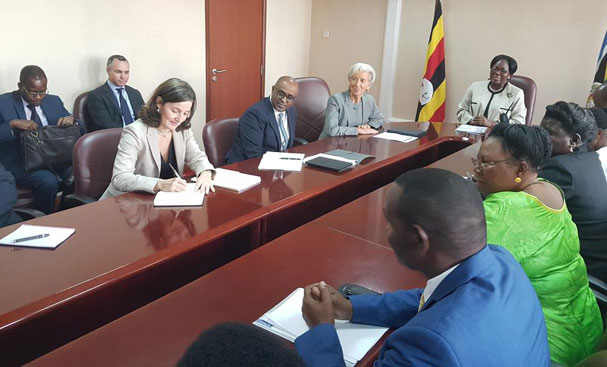
The Speaker of Parliament Rebecca Kadaga has called upon the International Monetary Fund (IMF) to support Uganda in streamlining Gender Budgeting.
In a meeting with the head of the IMF Christine Lagarde at Parliament on Friday, Kadaga highlighted the challenges faced by women and noted that funds allocated to the gender sector were still inadequate.
Kadaga emphasized the need for exclusivity in budget allocation adding that because of this gap in budgeting, women Speakers from different Parliaments are taking steps and meet annually to find ways of integrating the needs of women in their countries budgeting processes.
“I am happy that the Parliament of Uganda is championing the fight for women and especially with the introduction of the gender and equity compliance certificate. We will track all the sectors and evaluate them accordingly,” she said.
Kadaga further requested the IMF to support investments in Uganda as this would increase employment opportunities for the youth.
Lagarde said that the IMF is passionate about promoting investments in areas that touch the social fabric such as health and education. She underlined the need for a conducive environment if Uganda is to attract foreign direct investment, emphasizing a fast process of obtaining licenses, a predictive, secure and clear set rules of business as a core condition to attracting investors.
Speaker @RebeccaKadaga meets #IMF head Christine Lagarde at Parliament @newvisionwire @nbstv @DailyMonitor @ntvuganda @pwatchug @EA_Bunge pic.twitter.com/jefd8RYBsT
— Parliament of Uganda (@Parliament_UG) January 27, 2017
“Infrastructure is a very important aspect in IMFs intervention plan but we realized that without having proper social structures in place, then our interventions cannot be fully realized. This is why health and education are topical areas of interest for us at the IMF,” she said.
Lagarde commended Uganda on the progress made in poverty reduction but expressed concern over the low domestic revenue mobilization. She said that a better framework needs to be implemented because Uganda’s revenue collection is still low (13%) compared to the other African countries with 16% and above.
Lagarde also cautioned Uganda on relying on foreign aid, especially during this time of uncertainty when a lot of global policies could change and instead advised that building a resilient economy through harnessing opportunities within Uganda and the region, training and improving local skills of people such that they tap the opportunities that come with big projects. She says this would contribute greatly to the GDP.
In attendance, the Chairperson Budget Committee Amos Lugoloobi (Ntenjeru North) faulted the government on high domestic borrowing which he says leads to high interest rates. He further said that as a result of the overwhelming arrears, the government is left with no money to lend to the private sector yet the government could benefit more by lending to the sector.
The Chairperson Committee on Natural ResourcesAlex Byarugaba (Isingiro County South) echoed the need for heavy investments in family planning and health insurance. He said that Uganda, which has a population growth rate of 2% would reap massively from its infrastructure plans if population is balanced with the GDP.
Christine Lagarde is the 11th Managing Director of the IMF and the first woman to hold the position after being elected by the IMF executive board in July 2011.
****
editor@independent.co.ug
 The Independent Uganda: You get the Truth we Pay the Price
The Independent Uganda: You get the Truth we Pay the Price





